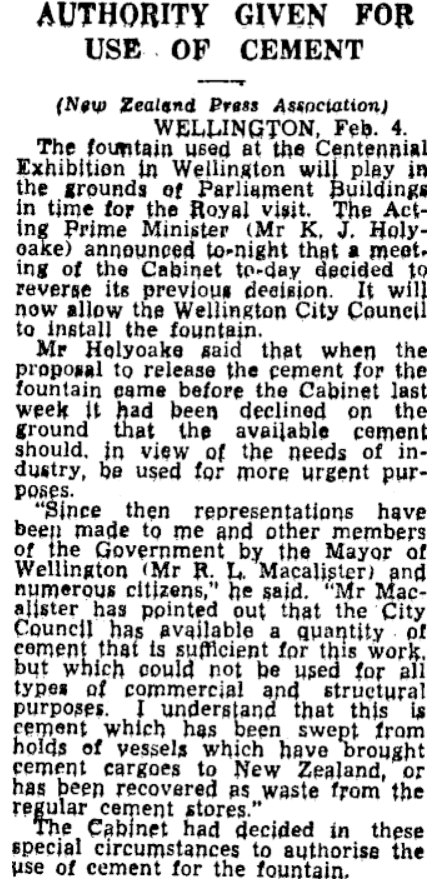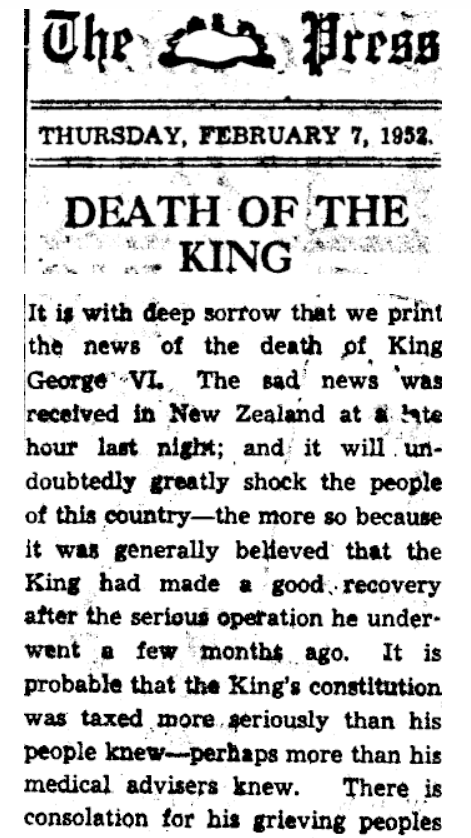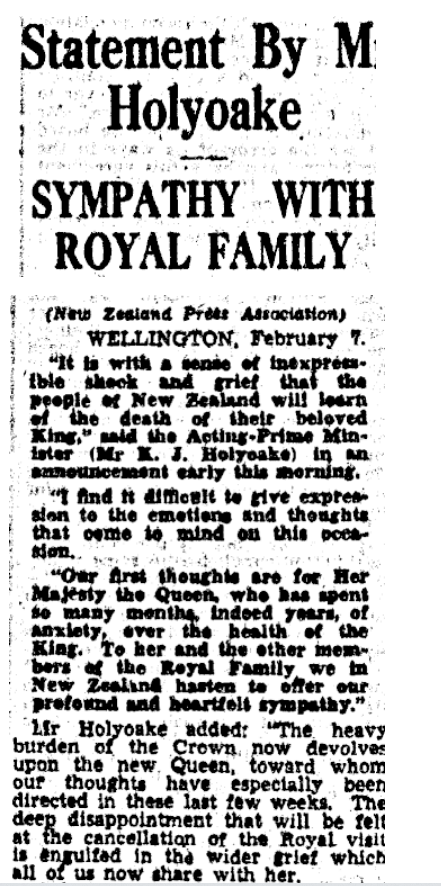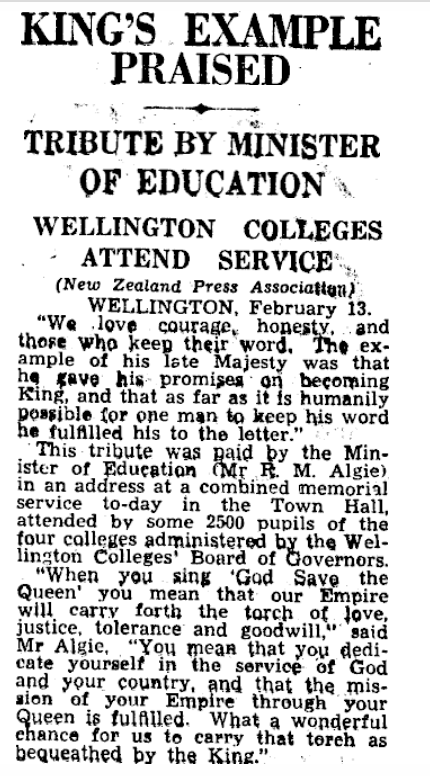On 7 February 1952, New Zealanders woke and – whether they turned on the radio or picked up the morning newspaper – only then did most learn that the previous afternoon King George VI had died, and that his daughter Princess Elizabeth was now our queen, Queen Elizabeth II. 70 years ago, before most of us were even alive.
To look at today’s New Zealand media one might suppose that some decades ago New Zealand had angrily tossed out the monarchy. There has been barely any mention of the 70th anniversary of the accession of New Zealand’s Head of State and what coverage there has been seems determined to treat it as British news, not as news about our own Head of State – she holds that office by laws passed by New Zealand’s Parliament, and polls suggest that today’s New Zealander’s still favour the system of constitutional monarchy that we share with the UK, Australia, Canada, and a variety of other countries. Much as a significant chunk of the media class might lament it, Elizabeth is our Queen, and has been for 70 years now. Whether as Queen of New Zealand or of her other realms and territories, her reign is now one of the very longest ever in recorded history. If one dates modern New Zealand from some time in 1840, she has been our head of state for almost 40 per cent of our history. A remarkable life of service.
(And, in fairness, while the media have preferred to play down any sense of Elizabeth as our Queen, the Prime Minister did put out a gracious and fitting statement.)
Anyway, I got a bit curious about how the accession of the Queen, 70 years ago, had been marked in New Zealand and recorded in the New Zealand media. Papers Past is a wonderful resource although of the major city papers sadly only the Press is available for 1952.
I started with the edition of Tuesday 5 February. In that paper it was reported that preparations were well underway for the planned visit to New Zealand in May of Princess Elizabeth and Prince Philip – undertaking the tour that the King himself had originally hoped to do. The Assistant Comptroller of the Royal Household had arrived on the 4th “to discuss final details and matters of etiquette. The economist is me could not, however, help noticing this element of the story.
It was a different time indeed, when the Cabinet was allocating cement.
The arrival of the Princess and her husband at the Kenyan lodge, where she was receive the grim news of the death of her father, was recorded in another story in which it was noted that the Queen and the Duke had attended Evensong at the small local church where “she spoke to the man who alone laid every stone of the church”.
What of Wednesday 6 February? It was a normal working day in New Zealand (and, as far as I can see from the table of contents there were no stories about the Treaty of Waitangi or the like). The Prime Minister – Sid Holland – was in Paris. Back here there were further reports of the forthcoming royal visit, including a push to keep handshakes to a minimum, and stories from the visit to Kenya. It was mid-summer and in Dunedin the touring West Indies cricket team had just beaten Otago.
King George VI died at Sandringham in the early hours of 6 February (New Zealand time being 12 hours ahead of that in the UK). The news was announced to be public at 11am (UK time).
In those days, the front pages of newspapers still seemed to be devoted to classified advertisements. It was no different in the Press of 7 February 1952. The news of the King’s death, and of the accession of Queen Elizabeth, appeared on page 5. This appears to be the editorial, and these were the first few sentences.
The Cabinet had met as soon as our government received the news, and the acting Prime Minister (Keith Holyoake) issued a statement in the early hours of the morning.
Despite the late hour – and presumably only for later editions – there are large numbers of stories, and photos (including one of the new heir to the throne, Prince Charles) over two pages (even managing to note that the forthcoming visit to New Zealand was now cancelled). There was an article about the visit by the then Duke and Duchess of York to New Zealand – and Christchurch in particular – in 1927 (among many other details, the Duke had had dinner with Labour leader Harry Holland in Westport).
The death of the King was marked immediately by the closure of all New Zealand schools on 7 February, and the closure of all government departments (other than essential services) for the afternoon of 7 February. No doubt there were many statements by local dignitaries around the country, but this was the statement by the (Labour) mayor of Christchurch.
In Greymouth, the mayor had requested that the bell of the local Catholic church be tolled 15 times (soon after the news first came through), once for each year of the King’s reign.
By the next issue of the newspaper – that for Friday 8 February – we still got through a great deal of other news first (the cricket test began that day in Christchurch) before the best part of three pages of coverage of the royal news.
There was a thoughtful editorial, even if it was a little wide of the mark with its suggestion “many [ in New Zealand] will never see her”, given the huge crowds for her first tour of New Zealand two years later. There was news of the forthcoming New Zealand official proclamation of the accession of the Queen, to occur the following Monday (more details here from the next day’s paper). The article is well-worth clicking through to for the details of official mourning, for the suggestion that employees should as far as possible be given time off on that Monday to attend local ceremonies marking the accession. This is just one snippet
Tributes from all manner of individuals and bodies – here and abroad – flowed in, and find a place in the pages of the Press. Here is an account of official American tributes and observances. And preparations for the funeral. From the next day’s paper, many resolutions of sympathy and loyalty.
By Monday 11 February, plans were in place. The King’s funeral was to be held that Friday (the Queen had requested that the day not be a public holiday). And the Prime Minister – who had been visiting West Germany when the King died – made a broadcast to New Zealand from London. In the same article it was reported that Mr Holland would be received by the Queen on Wednesday. Meanwhile back here the Governor-General, the Cabinet, and other dignitaries had attended a memorial service at (now Old) St Paul’s in Wellington. There were reports too of the special services in the churches of many denominations. If you wanted legal detail on the accession process, the Press had it covered.
In the Press of the 12th, you could read the (quite lengthy) account of the Christchurch civic proclamation of accession ceremony held the previous day – several thousand attended that ceremony, and there were similar smaller occasions in the boroughs around the city.
On the 13th we read that both the Prime Minister and the Leader of the Opposition (Walter Nash), both of whom had already been in London, would represent New Zealand at the funeral for the King. We also read of the Queen’s own declaration in taking her oath.
Back in New Zealand, in the following day’s paper we read some remarks made by the Minister of Education at a combined (four schools) memorial service in Wellington Town Hall.
The next day’s paper was full of articles about the funeral, but also carried this report of the Prime Minister’s meeting with the Queen, including this snippet.
And on the 16th, we read of the two minutes silence in memory of the King, and of great bell in Christchurch Cathedral tolling 56 times, once for each year of the King’s life, and so much more.
It was another age in many ways, but these surely were the monarchs of New Zealand, not by force or coercion but by the free consent, and loyalty of people, high and low, of all races and religions up and down New Zealand.
As indeed, Elizabeth II today is, by free choice of our own Parliament,
“Elizabeth the Second, by the Grace of God Queen of New Zealand and Her Other Realms and Territories, Head of the Commonwealth, Defender of the Faith—”
We shall not see her like again, whether in New Zealand or in her other realms and territories. But the 70th anniversary of her accession, to our throne, should very much have been New Zealand news.








The country is coming apart at the seams Michael.
LikeLiked by 1 person
Yep, You are well off out of it. And while much can be blamed on the current government, it isn’t clear that any other party would really be consistently materially much less bad.
LikeLiked by 1 person
I agree. When the PM announced the initial COVID restrictions – with support from the loyal opposition – it overruled legal prescedent going back hundreds of years, whether it was allowing police search, removing the right of trial by jury, or suspending property rights and overruling contract law. And the courts, on reviewing this, said it was illegal, but then justified it, effectively saying the ends justifies the means. Appalling.
And as this government had an absolute majority the risk is, as they lose popularity – as they clearly have – rather than move to the political centre, they see their remaining time in office as an opportunity to shift NZs political structure, with MMP effectively locking in those changes. In other words, dont expect them to ease up on their policies. Theyre more likely to take SS New Zealand down with the engine set at full steam ahead.
LikeLiked by 2 people
Why are constitutional monarchies generally the best governed countries? It removes the many distractions of the ceremonial duties of head of state from the political elite so they have more time to solve child poverty, the housing crisis, climate change, etc.
Queen Elizabeth II (or I in Scotland) will leave one bad legacy: her competence. Being a constitutional monarch requires no competence. They can be dissolute, foreigners without a word of English and even insane. Charisma may help but is not essential. The main requirement is to live a life avoiding any assertions about politics or religion.
Many will cringe about a Queen Camila but how much worse would be a president ‘x’ where ‘x’ is a Kiwi politician past his/her expiry date.
LikeLiked by 1 person
I’m probably less optimistic than you Bob , and suspect any causation runs the other way (stable well-governed states had little reason to abandon evolving constitutional monarchies). I also reckon that in today’s spotlight the personal conduct etc of the monarch matters a fair bit, and thus altho the Queen has been a remarkable woman I’m not sure the next two generations offer a great deal in a v different world, whether in the UK or Nz/Aus/Canada. I’ll be sad -or dead – when it happens, but I don’t suppose our govt/governance will be any worse than Ireland’s.
LikeLike
We have had 70 years of admirable personal conduct with efficient public relations protecting the monarch’s subjects from embarrassments. So preferable to the Kardashian clan in America.
Wikipedia lists 43 countries and even ignoring the tiny places it is a surprisingly successful list. PNG is hardly well-governed but compare it to Africa equivalents and it is doing well; Thailand compares well to its neighbours; Jordan compared to its neighbours. Many of those stable well-governed countries such as Japan, the Scandinavian and Benelux countries can thank their monarch for permitting then to emerge from their near total destruction in WW2.
Those countries without a monarchy display regret – watch a selection of Korean dramas or the fascination that the French and American films have for princesses.
The next two generations offer a continuation of a millennia of monarchy. They are bound to be less able than our Queen but that doesn’t matter. The joy of monarchy: no need to replace them every election cycle.
LikeLiked by 1 person
How I wish I shared your view, But I look at Switzerland, Austria and Germany, and it isn’t obvious that Portugal is governed less well than Spain, or Finland than Sweden. Or South Korea and Singapore than Japan. PNG beats out Zambia and Zimbabwe, but it isn’t obvious Swaziland has it over Botswana. Nor that PNG is better governed (albeit fewer actual coups) than Fiji.
Seems to me that when NZ becomes a republic – not, I hope, in my lifetime – we will end up with a structure like Ireland, and with a mix of presidents who look quite a lot like the sort of people (some good, some bad, some partisan, most not) Ireland gets as president. Fortunately, there isn’t much appetite for American systems these days.
LikeLike
Thank you for noticing Michael.
LikeLike
Regarding the cement for the fountain, the story my Dad told me may be apocryphal but given he was a keen fly fisherman for trout and that the Queen Mother was also, he claimed that the Horahora Road wending down the edges of Lake Karapiro from Arapuni was tarsealed in preparation for her visit sometime in the 1950’s.
I accepted this story as true because it did seem unusual to me as a child that such an empty road was not gravel when so many around it still were in the 1970’s.
LikeLiked by 1 person
Very well put Michael.Sad to see what we have become-racially divided; an inept socialist government;a country where merit and service has been replaced by a focus on differences and preference based on political identity; and where “democracy” is a joke. I and many of my generation salute Queen Elizabeth II and thank here for her generosity of spirit. Martin H Devlin ONZM, ED and Bar Professor Emeritus
LikeLiked by 2 people
You’re right, Michael, it was a gift for the media and could have added a positive towards the division that has sadly come upon us this past year.
Yesterday the BBC noted the strength and stability Queen Elizabeth brought to Britain.
In all honesty we should acknowledge that she did the same for the Commonwealth. How much worse off might we be if the friendships with world leaders which our Queen made and fostered throughout her reign had not been attempted.
It is on such endeavours that our civilization depends.
LikeLiked by 1 person
Thank you for putting this together Michael. We must suffer to be wise, according to the Ancient Greeks. I was born in the year of Her Majesty’s accession. How low New Zealand has sunk in my lifetime, I fear for the future.
LikeLiked by 1 person
I am instinctively a republican but in NZs present circumstances would never vote to abandon the monarchy. It is the only institution holding back the flood of constitutional bilge water that would surely come if removed. If NZ became a republic now there is simply no competing vision for how the country should be run, besides that offered by the statist green/social democratic bloc and its occultist ToW companion. I guess in the end this is the argument for a constitutional monarchy – the power in the monarch is not that which he or she holds, but that which is withheld from ambitious politicians. I like the metaphor from Peter Hitchens on this – the King in chess is powerful because he occupies space no other piece can.
LikeLiked by 1 person
My instinct is republican too but a life time of computer programming taught me “if it works don’t fix it”.
Your sentence “the power in the monarch is not that which he or she holds, but that which is withheld from ambitious politicians” is exactly what I was trying to say but expressed better.
You and Mr Hitchens don’t play chess. The game ends when the Kings square would be occupied by an opposing piece – a country does not end when a King is deposed. The metaphor should be that winning requires the protection of the weakest piece. A country should be measured not by how successful the elite or the average are by how those who are unable to look after themselves are treated; the very young, very old and the badly disabled.
The interesting piece is the Bishop; only English-speaking countries believe winning a battle is assisted by a Bishop; in other countries it is known as an Elephant, a Camel, a Runner or a Shooter all of which would be useful in a fight. In France it is known as a Fool or Jester which is weirder than Bishop but then like my sons, they are French.
LikeLiked by 1 person
Like many of my fellow NZers I am opposed to privilege, particularly inherited. It seems bizarre that anyone would want to institute the sort of tribal born to rule system of the Maori world in our wider government systems. The one exception is our constitutional monarchy, on both practical and heritage grounds. The system has served us well and will continue to do so under Charles and William. That our media have failed to mention the Jubillee appropriately and the Ardern Government has failed abysmally to celebrate it is awful but are we surprised? Sunday 5 June we’re having the Big Jubillee Lunch. I recommend it!
LikeLiked by 1 person
Ironically, a constitutional monarchy, like the slave whispering ‘remember, Caesar, thou art mortal’ into the ear of the conquering general, acts as a check on hubristic politicians who have succumbed to the allure of power and their own press.
Having political leaders bow or curtsey to a Monarch ( whose real power derives from her standing with the populace – few better examples than Queen Elizabeth II) serves to remind politicians that they still answer to a ‘higher’ power.
Despite various missteps it may well be the image of the Queen mourning alone at Prince Philip’s funeral while ‘partygate’ was going on at 10 Downing Street that sees the end of Boris Johnson’s premiership.
LikeLiked by 2 people
Don’t really disagree, but in a NZ context politicians barely ever see the Queen, and the Gov-Gen has about as much or little legitimacy/standing as an Irish-style President would.
The image of the Queen sitting alone was powerful and in character, but it wouldn’t have anything like the same political force it does in the UK were NZ politicians engaged in the sort of antics Johnson was.
And some of the Queen’s stature comes from long service, and we won’t see a tenure that long for a very long time, if ever.
LikeLiked by 2 people
Thank you…a nice piece. Dad used to say why wouldn’t we continue the system, given the UK pays for it mostly. Jock Phillips’ recent remarks not as satisfying!
LikeLiked by 1 person